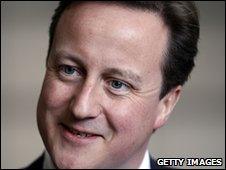CBI calls for public sector wage freeze
- Published

David Cameron has set up an inquiry into public sector pay
The CBI business organisation has called for an immediate two-year freeze in public sector pay.
While the CBI said there could still be wage increases for frontline staff and the lowest paid, the overall bill should not be allowed to rise.
Public sector union Unison said the CBI proposal could restart the recession.
Prime Minister David Cameron has already announced a cut in bonuses for senior civil servants, and an inquiry into wider civil service pay.
Members of the new cabinet have also voluntarily cut their pay by 5%.
Big savings
The Conservative-Liberal Democrat government plans to reduce public spending by £6bn in the current financial year, and Chancellor George Osborne is due to present an emergency Budget on 22 June.
This could also give details of changes to public sector pay.
The CBI said the civil service had to follow the lead of the private sector, where average pay fell by 0.9% last year.
By contrast, it said wages in the public sector increased by 2.8% in 2009.
The CBI estimates that selected public sector pay and recruitment freezes could save £18bn over the next two years.
It said the move could run parallel with new measures to allow businesses to create jobs and boost economic growth.
Union response
Richard Lambert, director general of the CBI, said he wanted to see a detailed plan for trimming the public sector wage bill in the Budget.
"Experience suggests that the best way of bringing down a substantial deficit without damaging growth is through spending restraint rather than raising taxes," he added.
Unison said it "condemned" the CBI's idea, and that reducing the wages of public sector workers would cut their spending power and thereby hurt the wider economy.
"Lets not forget, the public sector didn't cause this crisis, and it is wrong for the CBI to expect them to pick up the bill with pay cuts," said Dave Prentis, Unite general secretary.
"It also makes no sense to depress wages now. Hitting the spending power of public sector workers would drag down demand in our economy, just as it needs a boost to avoid a double dip recession."
TUC general secretary Brendan Barber agreed the economy was too fragile to cope with public sector wage cuts.
"This is special pleading from the CBI who are calling for the full brunt of spending cuts to fall on public sector staff, rather than the billions spent by government on private sector goods and services, such as consultants," he said.
"But even cuts to the public sector pay bill will hit the private sector as public servants will have less to spend."